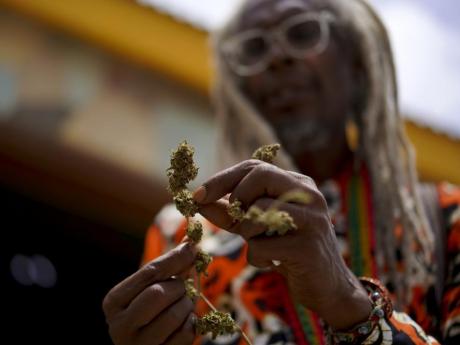Rastafari gain sacramental rights to marijuana in Antigua and Barbuda, celebrate freedom of worship
LIBERTA, Antigua (AP) — On the same ground where their enslaved ancestors were forced to plant sugar cane, Rastafari on this small island nation are now legally growing and ritualistically smoking marijuana.
For Rastafari, the practice brings them closer to the divine. But for decades, many have been jailed and endured racial and religious profiling by law enforcement because of their marijuana use.
The government of Antigua and Barbuda has sought to right that wrong. The twin islands recently became one of the first Caribbean nations to grant Rastafari authorisation to grow and smoke their sacramental herb.
“We're more free now,” said Ras Tashi, a member of the Ras Freeman Foundation for the Unification of Rastafari, who was arrested several times for growing cannabis but refused to plead guilty because to him, “it's a God-given plant.”
On a recent Sunday, he led chants and praise in the tabernacle on the foundation's farm located in Liberta's lush agricultural district. Tashi puffed on a corn husk-wrapped joint while others passed chalice pipes and waved Rastafari flags in the green, gold and red colour's of the faith.
“The government gives us our religious rights … we can come and plant any amount of marijuana … and no police can come and take up any plant. We fight for that right — and we get that right,” he said.
Rastafari elsewhere are pushing for similar religious protections. Experts and stakeholders think the Antigua and Barbuda law could give a boost to these efforts worldwide at a time when public opinion and policy are continuing to shift in favour of medical and recreational marijuana use.
Under the same law change, the island government also decriminalised the use of marijuana for the general public. In addition to the expansive religious use granted Rastafari, people outside the faith can grow four cannabis plants each and possess up to 15 grams.
“We believe that we have to provide a space for everyone at the table, irrespective of their religion,” Prime Minister Gaston Browne told The Associated Press at an interview in his office in the capital city of St John's.
“Just as we've recognised other faiths, it's absolutely important for us to also ensure that the Rastafari faith is also acknowledged … to acknowledge their constitutional right to worship and to utilise cannabis as a sacrament.”
“Ganja,” as marijuana is also known, has a long history in the Caribbean region, and its arrival predates the Rastafari faith. Indentured servants from India brought the cannabis plant to Jamaica in the 19th century, and it gained popularity as a medicinal herb.
It began to gain wider acceptance in the 1970s when Rastafari and reggae culture were popularised through music icons Bob Marley and Peter Tosh, two of the faith's most famous exponents.
Rastafari reject materialist values and often practice a strict oneness with nature, eating only unprocessed foods as part of “Ital” their faith's vegetarian diet. They also let their hair grow, uncombed, into dreadlocks.
But many of them were long treated as second-class citizens across the Caribbean islands, looked down on for their dreads and sacramental marijuana use.
The prime minister said that growing up poor in Antigua, he witnessed how adult Rastafari were chased by police and locked up, while children were not allowed in schools because of their hair. Browne also recalled how members of the Rastafari generously fed him “Ital” meals when his single mother, who had a mental illness, struggled to raise him and his siblings.
“They embraced me,” he said in his office overlooking palm trees, green hills and the turquoise Caribbean waters. “It speaks to that positive value of brotherly love … I was always socialised to embrace Rastafari.”
After Browne took office in 2014, he appointed Ras Frank-I, the late respected Rastafari leader, ambassador to Ethiopia. In 2018, Browne apologised publicly to the Rastafari community for the oppression and religious persecution they suffered. He also said that Rastafari should be given a stake in the production and economic benefits derived from medicinal marijuana as reparations “for the wrongs inflicted on this significant minority group in our countries.”
His government also helped build a Rastafari-run public school and led efforts to decriminalise marijuana use.
Jamaica, and most recently, the US Virgin Islands granted sacramental rights to cannabis. But Charles Price, a professor at Philadelphia's Temple University who focuses on Rastafari identity, said that it is Antigua and Barbuda's comprehensive initiative that could spur more organising for the sacramental recognition of cannabis in other islands.
They have become “test cases for the rest of the Caribbean,” he said. “They'll suggest the viability of this … so other nations can now look to these two nations and say, 'Ah, they've done it.'”
Follow The Gleaner on Twitter and Instagram @JamaicaGleaner and on Facebook @GleanerJamaica. Send us a message on WhatsApp at 1-876-499-0169 or email us at onlinefeedback@gleanerjm.com or editors@gleanerjm.com.

